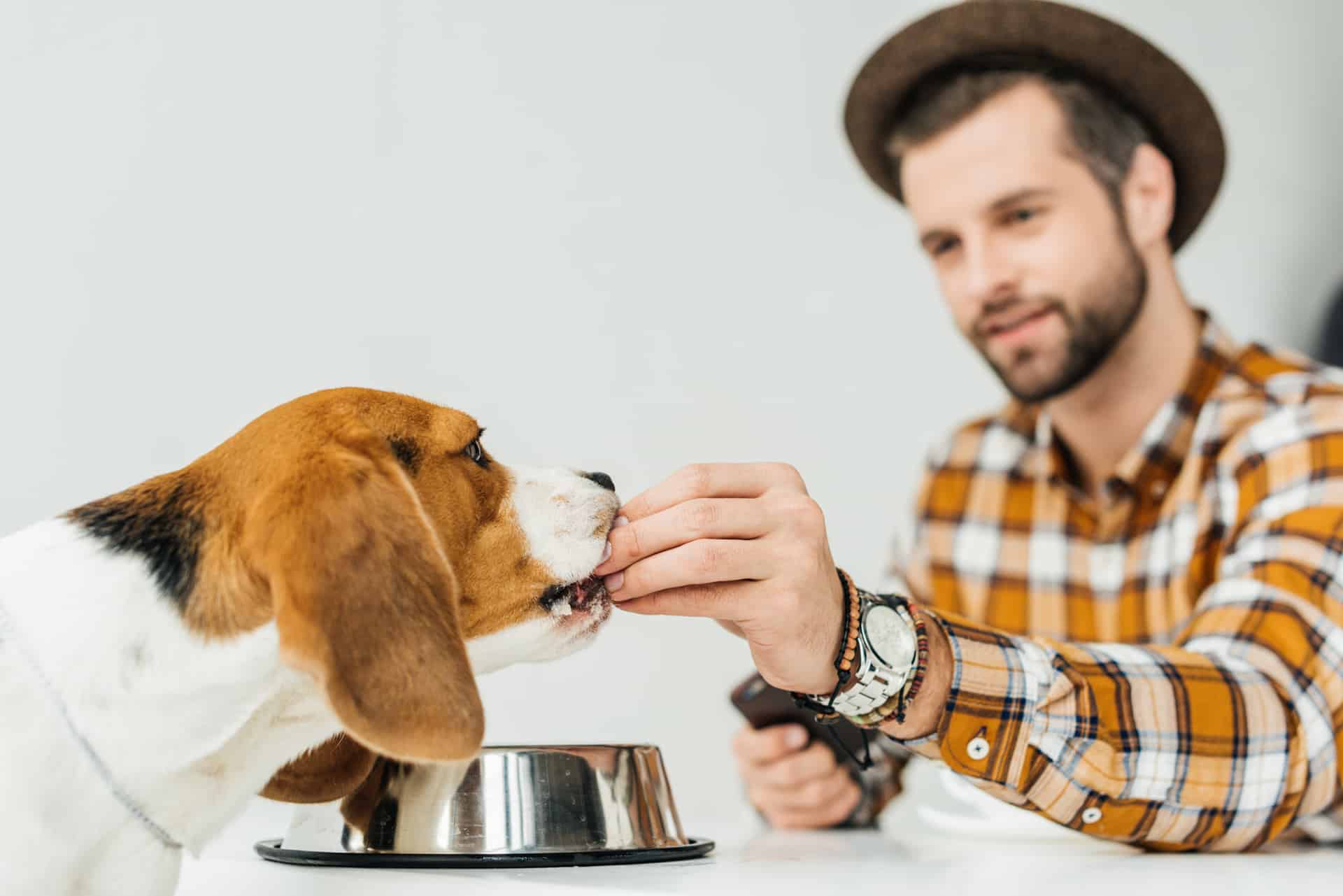How to Provide Optimal Nutrition for Your Dog
For the best nutrition, it’s important to give your dog a balanced, complete and tailored diet. Here’s how:
- Choose high-quality dog food that fits their age, breed, activity and health.
- Read labels to make sure it meets the AAFCO’s nutritional standards.
- Include proteins, fats, complex carbs to support musculoskeletal, energy and brain health.
- Add fruits and veggies for vitamins, minerals and fiber.
- Don’t give them table scraps or human food – it can cause obesity, imbalance and tummy troubles.
- Always provide fresh water.
- Consult with the vet to create a tailored diet for your dog and identify health issues.
Pro tip: Avoid raw or undercooked meat, eggs and bones – it can lead to bacterial infections.
Understanding your Dog’s Nutritional Needs
Giving your dog the best nutrition is very important for their health in the long run. It depends on their age, type and how much they do. Knowing your pup’s needs is vital, to make sure they get the right food and the right nutrients. This article will help you understand the basics of your pup’s nutrition.
Different Dog Breeds, Different Diets
Humans and dogs have different nutritional needs. To keep your pup healthy, it’s key to know what they require! Here’s what affects your doggo’s diet:
- Age: Puppies, adults, and seniors need different amounts of protein, fat, and calories.
- Breed: Size, metabolic rate, and health risks vary from breed to breed.
- Size and weight: Bigger doggos need more calories and nutrients than smaller ones.
- Overall health: Certain conditions like obesity, diabetes, or allergies may need special diets.
It’s always best to talk to a vet to decide the right diet for your furry friend. They’ll make sure they get the nutrients, vitamins, and minerals they need to stay healthy!
Nutritional Requirements for Dogs of Different Ages
A dog’s diet changes based on their age and life stage. Puppies, adults, and seniors all have different nutritional needs.
Puppies need high levels of protein, fat, and calories. Look for puppy food that has these nutrients.
Adults need a balanced diet. Choose dog food labelled “complete and balanced” to make sure they get the right vitamins and minerals.
Seniors need fewer calories and may need special diets depending on their health. Get dog food made for seniors or talk to your vet to figure out the best diet.
Giving your pup a balanced diet is important for their health and can help them stay healthy in the long run.
Tip: Check the label of your pup’s food to make sure it meets their needs. Don’t give them people food – it might be bad for them.
Identifying Health Issues and Changing Nutritional Needs
It’s key to detect health issues and adjust your pup’s nutritional needs. Here are some tips to keep your doggie healthy:
- Have regular check-ups with a vet. This can help you spot any health problems which will affect their nutrition. Dogs with medical conditions may need special diets as directed by your vet.
- Age is another factor. Puppies require more protein and calories to grow. Senior dogs may need fewer calories and joint-friendly supplements.
- Understand your pup’s breed and size. Large breed dogs may need specific nutrients for bone development. Small breed dogs should have kibble size that won’t choke them.
- Always provide clean water and choose high-quality food for optimal nutrition.
Deciding on the Right Food for Your Dog
Picking the best food for your pup can be tough. But it’s a vital choice. You must consider the age, size, activity level & health of your pup. Nutrition is key for your pet’s wellbeing. Do your research & let’s look at how to give your dog optimal nutrition.
Wet or Dry Food: Which is better?
Choosing dog food? Both wet and dry have pros and cons.
- Wet has more animal protein, moisture, and helps prevent dehydration. But it is expensive, short lived, and can cause dental decay.
- Dry is more convenient, lasts longer, and cleans teeth. But it may not be as tasty and has less moisture.
The best choice depends on your dog’s needs and likes. Talk to a vet for help making the best decision.
Understanding Dog Food Labels
Figuring out dog food labels is essential for pet owners. It helps them pick the perfect food for their pup and gives them the right nutrition.
Here are some must-know’s when looking at the labels:
- Ingredients: Go for high-quality proteins like meat, fish, or poultry. Avoid fillers and by-products.
- Guaranteed analysis: This section reveals the minimum and maximum of crude protein, crude fat, crude fiber, and moisture in the dog food.
- Nutritional adequacy statement: This shows if the dog food meets the minimum nutritional requirements from AAFCO.
- Feeding guidelines: Follow the guidelines on the label. But adjust the amount depending on your dog’s size, activity level, and age.
Understanding dog food labels helps pet owners choose the best food for their pup and make sure they get the right nutrition for optimal health.
Common Ingredients to Look for in Dog Food
When picking the right food for your pup, check the ingredients listed on the label. Here are some common ones to look for that will provide optimal nutrition for your furry friend.
- Protein: Dogs need protein to build and maintain muscles. Look for chicken, beef, fish, or lamb.
- Whole Grains: Carbohydrates from whole grains offer energy. Check for brown rice, oatmeal, barley, or quinoa.
- Veg and Fruit: These add vitamins and minerals. Carrots, sweet potatoes, peas, and blueberries are beneficial.
- Fats: Fats help provide energy and keep skin and coat healthy. Fish oil, flaxseed, or chicken fat are good choices.
- Probiotics: These are healthy bacteria that aid digestion and strengthen immunity. Look for probiotics on the label for a happy gut.
Pro tip: Check with your vet to make sure the food meets your dog’s needs.
Feeding Your Dog
Feeding your doggy is essential to giving them the best nutrition. A balanced diet of proteins, carbs, fats, vitamins and minerals is ideal. To ensure optimal nutrition for your pup, you must understand how much food, how often and which foods are best.
Portion Control: How Much to Feed Your Dog
Portion control is key for your pup’s nutrition and wellbeing. Here are some tips:
- The amount of food depends on age, weight, activity, and health.
- Follow the feeding recommendations on the dog food label. This usually gives a range, based on weight.
- Monitor your pup’s weight. Adjust portions up or down to keep them healthy.
- Divide the daily portion into two or more meals to stop overeating, and help digestion.
- Don’t overfeed. Obesity and other issues can occur.
- If unsure, ask your vet for advice.
How Often Should You Feed Your Dog?
Feeding your pup the correct amount and type of food is a must for their health. But how often?
It depends on age, breed, size and activity level. Puppies need 3-4 meals a day until 6 months. Adult dogs can be fed once or twice, depending on preference and lifestyle. Large breeds are more prone to bloat, so small, frequent meals are best. Quality and portion size are essential for optimal nutrition. Consult your vet for advice on your dog’s needs.
Homemade Meals vs. Store-Bought Food
When it comes to feeding your pup, homemade grub is healthier than store-bought. Commercial dog foods contain not-so-good ingredients that can harm your pet’s health over time. Homemade meals give your pup all the essential nutrients they need in a natural form.
Tips for optimal nutrition:
- Include a protein like lean meat, fish, or poultry.
- Add healthy carbs like brown rice, quinoa, or sweet potatoes for energy.
- Include a variety of fresh veggies for vitamins and minerals.
- Avoid high-fat and processed foods.
- And skip the foods toxic to dogs like chocolate, onions, and garlic.
- Talk to a vet or canine nutritionist to tailor a balanced diet to your pup’s needs.
Health Supplements for Dogs
Optimal nutrition for your pup? Health supplements can help! Supplements provide vital vitamins and minerals, and also boost their overall health and wellness. In this section, let’s discuss the different types of health supplements for dogs and tips to choose the best ones for your pet.
Identifying Your Dog’s Supplement Needs
Figuring out your pup’s supplement needs is a great way to give them the best nutrition. The right supplements can help with certain health issues, boost immunity, and keep them healthy.
Here are things to think about:
- Age: Puppies, adults, and seniors all need different supplements.
- Health Conditions: If your pup has a medical problem, like arthritis, joint supplements could help. Talk to your vet to find out what they need.
- Diet: Dogs on homemade or raw diets may need different supplements than those on commercial food.
- Breed: Different breeds need different vitamins, minerals, and other nutrients.
It’s important to chat with your vet to figure out what kind of supplements and nutrition your pup needs.
Vitamins and Minerals for Dogs
Vitamins and minerals are key to a doggie’s health and happiness. A balanced diet that includes these and other essential nutrients, proteins, carbs and fats will help keep them in top condition. Here are some of the most important vitamins and minerals for dogs:
- Vitamin A: Helps skin, vision and immunity. Sources: liver, carrots, broccoli and pumpkin.
- Vitamin B: Important for energy production and digestion. Sources: liver, eggs, whole grains and beans.
- Vitamin C: Fights inflammation, boosts skin and immunity. Sources: Dogs make their own, also found in berries, citrus and green veggies.
- Calcium: Builds strong bones and teeth, plus supports muscle function. Sources: yogurt, cheese, sardines and green veggies.
Pro Tip: Speak to your vet for the right nutrition for your pup, based on breed, age and health conditions.
Understanding Probiotics and their Benefits
Probiotics are live microorganisms that provide many health benefits when taken. Humans and dogs alike can benefit from taking probiotics. But it is vital to carefully select the right probiotic for your pup.
What to consider when choosing a probiotic:
- Strains: Look for probiotics with Lactobacillus and Bifidobacterium.
- CFUs: Choose supplements with a minimum of 1 billion CFUs.
- Purpose: Pick a supplement that meets your dog’s specific health needs.
Always consult a vet to decide on the best probiotic brand and dosage for your pet.
Common Nutritional Problems in Dogs
Pups can have nutritional troubles due to bad diets and lack of workout. Issues like being overweight, vitamin shortages, and poor digestion are common. Knowing these issues and the dietary changes needed to fix them is crucial for giving the best nutrition for your pup. Let’s go over some of the more frequent nutritional problems in dogs and what you can do to resolve them.
Coprophagia: Understanding Why Dogs Eat Their Own Feces
Coprophagia is a behavior in dogs where they eat their own poo. To prevent this, give your dog optimal nutrition and a balanced diet. Here are tips for optimal nutrition:
- Choose high-quality commercial dog food that meets AAFCO standards and suits your pup’s life stage, breed size, and activity level.
- Avoid feeding your dog table scraps, sugary treats, and other human foods with lots of fat, salt, and calories.
- Consider supplementing your dog’s diet with vitamins, minerals, and probiotics with a vet’s help.
- Monitor your dog’s weight, body condition, and poo quality regularly. Adjust their diet as needed.
By providing optimal nutrition, you can prevent coprophagia and other nutritional problems. Pro Tip: Talk to a vet if you notice changes in your dog’s behavior or digestion.
Obesity in Dogs: Causes, Effects, and Management
Obesity in dogs is a major health concern. It can lead to many issues like heart diseases, diabetes and joint issues. To keep our furry friends healthy, it’s important to understand the causes, effects and management of obesity.
Causes:
- Overfeeding
- No exercise
- Breed and age-related weight gain
Effects:
- Respiratory problems
- Difficulty in movement
- Joint pain
- Type 2 diabetes
- High blood pressure
- Kidney disease
Management:
- Balanced diet
- Physical activity
- Portion control
- No human food
- No free feeding
Optimal nutrition prevents common health problems and ensures our furry friends get the needed nutrients. Pro tip: Consult a vet before changing diet or exercise routine.
Nutritional Deficiencies: How to identify and treat them.
Identifying and treating nutrient deficiencies in your pup is key to giving them the best nutrition and avoiding potential health worries.
Common nutritionally related issues in dogs, as well as their symptoms, include:
- Calcium Deficiency: Weak and stiff bones, trouble moving, difficulty standing.
- Iron Deficiency: No energy, pale gums/skin, rapid breathing.
- Vitamin A Deficiency: Dry eyes/skin, no appetite, weak immune system.
- Omega-3 fatty acid Deficiency: Dull coat, itchy skin, more shedding, joint/heart problems.
To give your pup excellent nutrition, make sure their diet has a balance of proteins, carbs, fats, vitamins, and minerals, from natural sources. If you notice any signs of nutrition deficiencies in your dog, speak to your vet for a proper diagnosis and treatment plan.
Pro Tip: Regular check-ups and a healthy diet with plenty of exercise will help prevent nutrition deficiencies in your pup.
Frequently Asked Questions
Q: What types of food should I feed my dog to provide optimal nutrition?
A: It is best to feed your dog a high-quality dog food that is balanced and contains essential nutrients, such as protein, carbohydrates, fats, vitamins, and minerals. You can also supplement your dog’s diet with fresh fruits, vegetables, and lean meats, but be sure to consult with your veterinarian first.
Q: How often should I feed my dog?
A: It is recommended to feed adult dogs twice a day, while puppies may require more frequent feedings. However, every dog is different and may have unique nutritional needs, so consult with your veterinarian to determine the best feeding schedule for your dog.
Q: Can I give my dog table scraps?
A: While it may be tempting to give your dog your leftovers, it is not recommended. Human food may not provide the proper nutrition your dog needs and can lead to obesity or even toxicity if certain foods are consumed in excess.
Q: How much should I feed my dog?
A: The amount of food your dog requires will depend on their age, size, and activity level. Your veterinarian can provide you with a recommended feeding amount based on your dog’s individual needs. Be sure to measure your dog’s food carefully to avoid overfeeding.
Q: What should I do if my dog has special dietary needs or restrictions?
A: Consult with your veterinarian to determine the best diet for your dog’s specific needs. They may recommend a specialized dog food or suggest adding supplements or vitamins to their diet.
Q: How can I tell if my dog is getting the right nutrition?
A: Your dog’s overall health and energy levels are good indicators of whether or not they are receiving optimal nutrition. Healthy dogs should have shiny coats, clear eyes, and healthy skin. They should also have regular bowel movements and maintain a healthy weight. If you have concerns, consult with your veterinarian.







